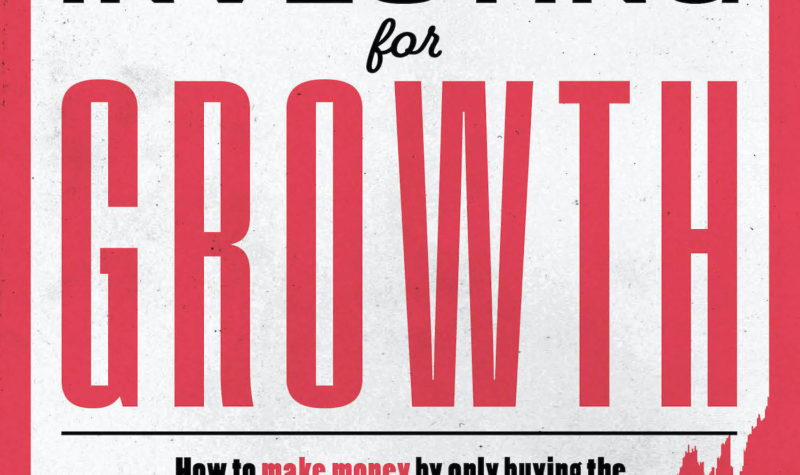How to make money by only buying the best companies in the world

Richard Gill, CFA, reviews Investing for Growth, a book by Terry Smith which makes the case for investing your money in the best companies in the world to ensure long-term returns.
Terry Smith is one of the great characters of the investment world. The former CEO of Collins Stewart and Tullett Prebon, he rose to prominence in the early 1990s after the publication of classic book Accounting for Growth. In it, Smith published details of the misleading accounting methods practiced by a number of firms, including Polly Peck and British & Commonwealth, which were supposedly successful but went on to go bust. He was subsequently fired by his employer UBS Phillips & Drew for refusing to withdraw the controversial but popular tome, which went on to sell over 100,000 copies.
Smith is perhaps best known these days for running investment management firm Fundsmith and the flagship £21 billion Fundsmith Equity Fund, one of the most popular funds amongst UK retail investors and one of the best performing. Launched on 1st November 2010, over ten years the fund has risen in value by 415%. That’s an astounding compound annual return of 17.8%, massively outperforming the benchmark MSCI World Index’s return of 183% over the same period.
Fundsmith was founded with Smith’s legendary “no nonsense” approach, looking to deliver long-term returns and charge no performance fees to investors. Its overall focus is on global shares in high quality businesses, with many Warren Buffettesque features being looked for. These include a high return on capital, competitive advantages, resilience to change and of course, attractive valuations. Fundsmith also tends to invest in companies with a long history. The current 30 constituents have an average founding year of 1926, meaning most have survived two world wars and some even the Great Depression.
While Accounting for Growth was somewhat of a sarcastic title, Terry Smith’s latest book does exactly what it says on the tin.
Investing for Growth is a collection of essays and articles written by Smith over the past ten years, published together for the first time to celebrate his fund’s first decade. Through a combination of annual shareholder letters, contributions to newspapers and other musings, he provides numerous investment insights, debunks many investment myths and makes the case for investing your money in the best companies in the world to ensure long-term returns.
Terryfic Analysis
The 70 or so articles in the book are presented chronologically, beginning in September 2010 just prior to the fund’s launch. But readers can peruse them in any order to get a flavour of how Terry Smith and his team approach their investment decisions. Perhaps one of the best places to start is Smith’s 2013 Financial Times article on his ten golden rules of investment. Some of his top tips for retail investors include: don’t try to time the market, deal infrequently, never invest just to avoid tax, and buy shares in a business which can be run by an idiot (because at some point it will!).
Smith and I share a view that you should be wary of companies that abuse the English language, so one of my favourite sections is his 2013 Telegraph article on the matter. While terms such as “innovative solutions provider” and “leveraging a seamless ecosystem” are just as confusing as they are annoying, Smith’s main point is that corporate jargon can often be used to disguise a problem. He prefers straight talking management, especially those who are happy to criticise their performance rather than be persistently “delighted” with their results every year. His beliefs are held true in his annual shareholder letters, where the year’s performance is always reviewed honestly, covering both the winners and the losers, and inevitably including one of Smith’s infamously entertaining rants.
Another favourite section is a trio of articles which look at some investing myths. Here, Smith covers three commonly held investment beliefs and shows that empirical evidence demonstrates that they can be wrong. For example, a 2012 study by Haugen and Baker showed that low risk stocks outperform higher risk stocks. This goes completely against the higher risk/higher reward theory core to the financial markets, with Smith suggesting that small caps could be added to a portfolio to boost returns and lower risk. Another article argues that re-invested dividends are over-rated and in fact not the main contributor to returns over time. Dividends are subject to tax and most often invested back into companies at above book value. In contrast, reinvested profits, the real driver of returns, are subject to no tax and are able to be reinvested to grow profits.
Fundsmith’s excellent attitude towards investor communication is highlighted in one of the final chapters of the book, covering the fund’s newsletter to shareholders at the end of Q1 2020. Smith informed investors that it was business as usual for the company in terms of service levels, reassuring given the government’s work-from-home guidance and that the stock markets had just hit a nine-year low following the pandemic-inspired plunge. Like any shrewd investor, at the time Smith also highlighted the opportunities that a stock market downturn can present. He seems to have taken advantage of them, with the fund having risen by 10.9% in the year to date as at 30th October, well ahead of the MSCI’s gain of just 1%.
Britain’s Buffett
Many successful UK based investors have been branded with the moniker “Britain’s Buffet”. But perhaps no one deserves the title more than Terry Smith, with his similar investment style having delivered consistent annual returns that the Sage of Omaha would be proud of. Readers of Investing for Growth will come to know Smith as not only a great investor but also a great writer, communicator and man of principle. The book makes an ideal Christmas stocking filler which will go on to become an essential part of any investor’s library all year round.
Comments (0)